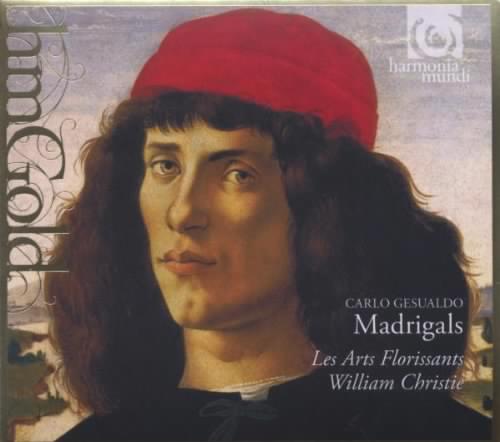Texte paru dans: / Appeared in:
|
|
|
Outil de traduction ~ (Très approximatif) |
|
|
Reviewer: James
V. Maiello Harmonia Mundi have lately been reissuing much of its catalog of recordings made by William Christie and Les Arts Florissants in the 1980s and 1990s, a boon to collectors and casual listeners alike. These reissues, the present one included, reflect conventions of performance practice and interpretation from the time of the original recording dates. The madrigals here, for example, tend toward the operatic, being soloistic and a touch dramatic. Whether or not one prefers this style, this disc is a valuable record of the cutting edge of performance practice in the late 1980s. As such, this album may be doubly attractive to listeners, first for its fine performances and second for its value as a part of the historical record.
Christie presents a selection
of madrigals for five voices from Gesualdo’s Third, Fourth, Fifth, and Sixth
Books of Madrigals respectively. He begins with the compact Ahi,
disperata vita, full of tense dissonances and torturous suspensions.
Although I’d prefer more direction in the lines (as one often finds in
Alessandrini’s recordings), these are intelligent interpretations, sung
expertly. Book 3 marks the beginning of Gesualdo’s more mature style, and
one can already hear the chromaticism of his late works emerging in
madrigals like Non t’amo, o voce ingrata. The section closes with a
real highlight, a six-minute “canzona francese” played by uber-harpist
Andrew Lawrence-King. Lawrence-King’s reading is fluid and delicate, with
flashes of virtuosity and excitement at all the right moments. Moving to Book 4, Gesualdo’s electrically charged writing is on full display, especially in the substantial Sparge la morte al mio Signor. Christie’s approach makes the most of contrast between homorhythmic sections and more imitative passages. At times, the textures seem a bit muddy, though I’d sooner believe that the problem lies with the recording itself and not Christie’s singers, who are usually impeccably clear. Lawrence-King takes center stage again, this time with a pair of transcribed madrigals and assisted by Erin Headley on lyrone. Continuing with selections from Book 5, one finds even more adventurous music and equally exhilarating singing. The ensemble sails through scales in Occhi del mio cor vita, stopping nonchalantly on dissonances, creating dramatic moments of movement and stasis. An instrumental version of Correte, amanti features harp and theorbo. Sadly, Christie has omitted perhaps the most well-known of the Book 6 madrigals, the sinewy Moro lasso. Nonetheless, the final set on the program provides a solid cross-section of Gesualdo’s late madrigals, including a sublime reading of the perennially-anthologized Io parto. The voices are smooth and balanced, but there is again a lack of transparency that may be attributed to the recording quality. The singers are nimble and nuanced throughout the recording, though, and there are far more hits than misses. On balance, this is a fine sampling of Gesualdo’s madrigals, and the return of this album to Harmonia Mundi’s catalog is certainly a welcome one. | |
|
|
|
|
|
|
|
Cliquez l'un ou l'autre
bouton pour découvrir bien d'autres critiques de CD |
|




